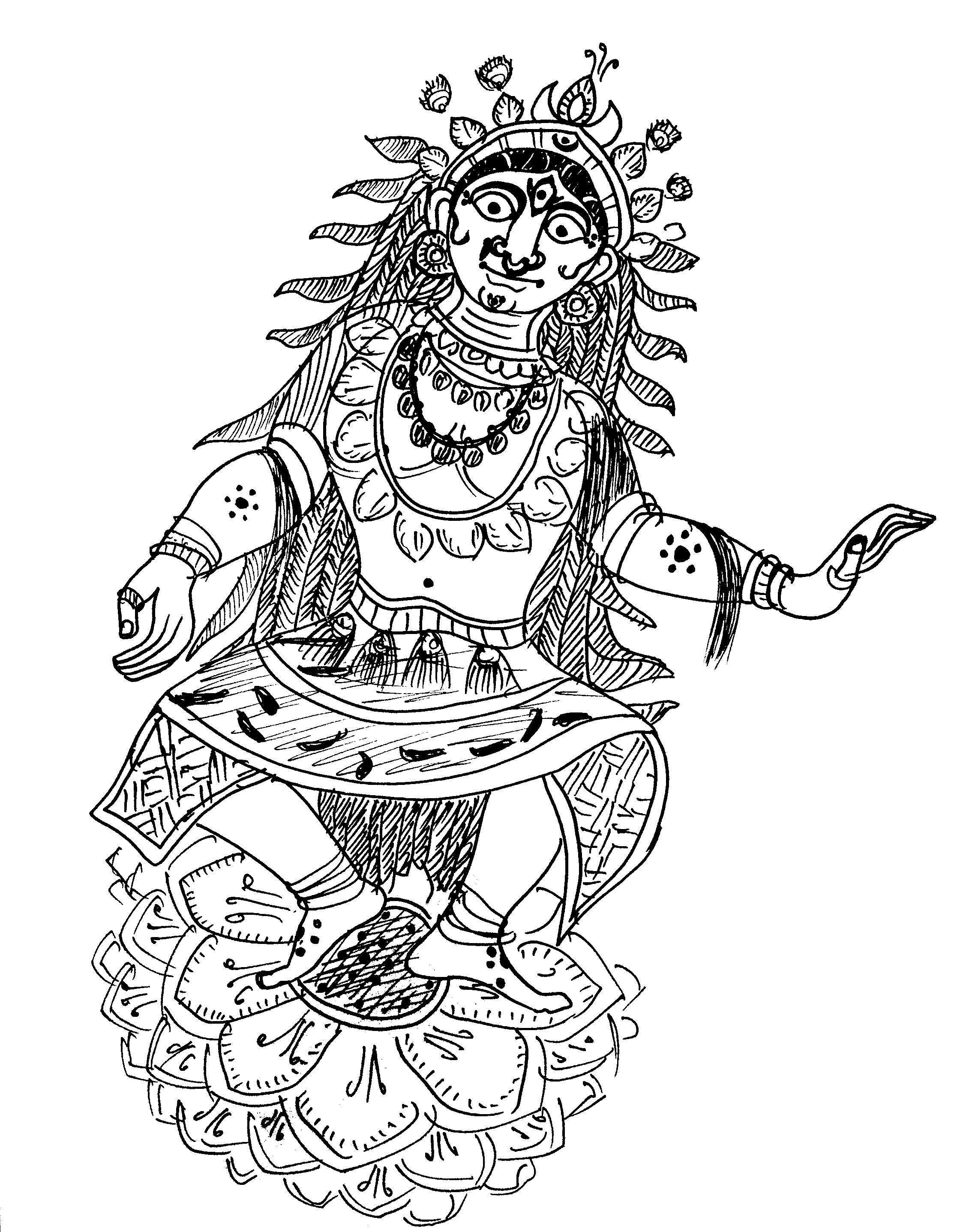Published on 20 May 2019 in OrissaPOST
I made a list of the female poets of Odisha.
There are almost 50, of which the very first is by the name of Jira Dei. Jira Dei writes a commentary on the Sisu Beda, which is one of the cornerstone texts of the Odia Natha tradition. It is traditionally attributed to Gorekhanatha. Jira Dei curiously writes her name at the end ‘ବୋଲଇ ଜୀରାଦେଈ ୟେ ବିଷମ ସନ୍ଧ’ (which means— ‘this is a difficult nut to crack’) and ‘Dombi Mata Jhamaka Gita’. So she is calling her commentary Jhamaka Gita and she is identifying herself as Dombi Mata, ‘matriarch of the clan of Dombas’.

The Domba community are mostly found in the southern districts of the state. A Dombi is a female of this ethnic group. Recurring references to a Dombi are found in the Charyapada songs (originally named Ascharjya Charjyachaya). These are layered cryptic songs that the eighty-four Mahasiddhas (‘great adepts’) wrote between the 8th-12th centuries. Their language is a curious predecessor of modern-day Odia, Assamese and Bangla. Of these, the songs of Mahasiddha Kanhupa (probably from South Odisha) repeatedly invoke the Dombi’s character :
ତୁଲୋ ଡୋମ୍ବୀ ହାଉଁ କପାଳୀ / ତୋହୋର ଅନ୍ତରେ ମୋଏ ଘେନିଲି ହାଡ଼େରି ମାଳି
You are a Dombi, and I am a Kapali— for your sake have I put on this garland of bones.
About Jira Dei nothing else we know. We only know that she uses esoteric metaphors to write about Nath Traditions— that’s all we know. And perhaps we have no other Odia commentary that is as early. Hers would probably be around 12-13th century latest. That is much, much before Sarala Dasa’s Mahabharata. It is fascinating to imagine this powerful Dombi woman, adept in Vajrayana and expounding cryptic metaphors. We have no other clue about who Jira Dei is or what she did.
Next is Nandabai who lived probably around the 16th century. She wrote a chautisa called Nandabai or Rukmini chautisa. It talks about the story of Rukmini and apparently, has been published. She is important because many of the medieval poets, including Upendra Bhanja, mention her song in the beginning note as ‘sing this song in the way of the Nandabai’s Chautisa’. Her song was apparently very famous.
Then comes Madhabi Dasi, a close associate of Chaitanya, 16th century, born around Puri. Madhabi Dasi’s only creation [update: I found more] is a single janana to Jagannatha, called chakanayana he jagu-jibana sri hari. Interestingly she writes about all female devotees of Jagannatha in order. At the end she tells, “I am also a lady—save me!”. So she mentions Ahalya, she mentions Draupadi, even the Mruguni [doe], then she mentions Mirabai and Karamabai. Karamabai is a 9th century Maratha lady who came to Puri.
Brundabati Dasi from Puri, 17th century, wrote a text on the Vaishnava philosophy of Odisha. Her son wrote, grandson wrote, husband wrote, father wrote— everybody in her family wrote. We see a fascinating example being set here.
Then there are about two dozen princesses Surjyamani, Khirodamali, Krusnapriya, et cetera. They wrote auspicious marriage songs, Mangala Gita. Apparently, this was one area where female poets were in the majority— the sphere of the household and rituals of auspiciousness.
There are a few more of them who wrote some Krishna songs. Some others wrote separate kabyas such as about the story of Aniruddha and Pradyumna. The iconic bhajana ‘Thaka Mana Chala Jiba‘ was written by a Saria Bhika, which could be the name of either a man or a woman.
There is also a Hiradasi Bangaluni, who writes in a mixture of Odia and Bengali and in the middle of the song “Here! Jagannath is coming for the Bengalis”. Quite controversial a comment!
That’s all. We should be proud of the ancient poetesses of this land— from queens to dombis— wonderful women who talk about everything from philosophy, devotion, culture to romance, warfare, society.

5 replies on “Ancient poetesses of Odisha”
Wonderful writeup, much appreciated. Great job in bringing out such a powerful aspect of our literary heritage.
Absolutely fascinating.
Every point informative Prateek..looking forward to more
Prateek, so well-researched.
I am an arranger of words, a writer —– a poet too.
Do email me as I have a project in mind that I hope you will do with me.
Best wishes, Mrs. Jayshree Tripathi
@ JayMTrips
Prateek,
Kindly respond to my emails – I had asked you to reply today, as you were busy with an event.
Thank you.
Mrs. Jayshree Tripathi